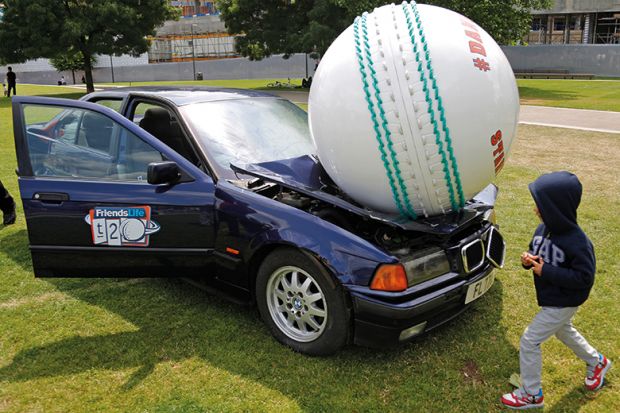The government’s new organisation in charge of UK research, UKRI, faces a financial hit amounting to millions of pounds a year as it has not yet been able to secure charitable status, Times Higher Education can reveal.
UK Research and Innovation – which said it had an “aspiration” that the problem will not affect research funding – was launched on 1 April, encompassing the seven research funding councils as well as the non-departmental government body Innovate UK.
But while the research councils previously operated with charitable status under the Research Councils UK umbrella – exempting them from paying 20 per cent VAT across a range of income and expenditures for businesses – the councils’ merger with Innovate UK, which is not classed as a charity, means that UKRI has not yet been able to secure charitable status.
UKRI confirmed to THE that it is currently operating as a “Body Corporate” – liable to taxes that include standard rate VAT (20 per cent) and business rates.
A spokesman said charitable status “could not be automatically transferred to UKRI on its formation”, but that the body “is actively working to resolve this”.
“UKRI is ensuring that it is tax compliant during this period, and this includes ensuring that suppliers charge VAT on goods and services where applicable. It is our aspiration that this will not affect the scale of our investment in research and innovation,” he said.
As a result, the individual research councils “will be obligated to pay standard rated VAT on all their purchases”, he added.
UKRI’s spokesman said that “if the matter is not resolved, the estimated impact to UKRI would be about £15 million per year”, according to the body’s own financial advisors.
A source – who asked not to be named – told THE that very few people knew of the issue, even within UKRI, because it was “such an embarrassing blunder”. The issue had been an oversight in transition to the UKRI regime, the source suggested. Experts say such an oversight could already have impacted on the overall science budget of £6 billion promised in last year’s Industrial Strategy.
Amanda Darley, a tax specialist for the British Universities Finance Directors Group, said it was difficult to determine the exact financial impact, since “as a unique public body, UKRI are likely to have a unique VAT situation”.
“However,” she told THE, “as their income is generated from government grants, they do not have taxable income and it is therefore highly unlikely they can reclaim any VAT incurred on costs in this way.
“So yes, unless any other special VAT regimes apply, any additional VAT cost will be impacting on their overall budgets, unless the government increases their income to cover this.”
Richard Asquith, vice-president of global indirect tax at taxation specialist Avalara, said he agreed that any tax paid since UKRI’s foundation would most likely not be recoverable, even if charitable status were achieved at a future date. “Additionally, they risk becoming liable to corporation tax at 19 per cent at the end of each year,” he said.
Organisations in the UK with charitable status are eligible for tax relief on most types of income and expenditures. Even without it, some elements of UKRI’s activity will still not be taxable, such as research grants. But goods and services, medical equipment costs, building purchases and rent, alongside a number of other items, will be subject to VAT.
While UKRI says the cost is estimated to be about £15 million a year, basic analysis of the research councils’ growing budgets demonstrates how the figures could rapidly add up in the coming months and years.
In the 2016-17 financial year, the Medical Research Council spent £7.8 million on goods and services, according to a public financial statement. The Biotechnology and Biological Sciences Research Council spent £5.6 million on non-staff operating costs. The Science and Technology Facilities Council's report for 2016-17 suggests its corporate services department spent £20.4 million on goods and services.
Additional costs to come as a result of the lost charitable status will be met centrally by UKRI, but it is not yet clear whether future budgets will be reduced to account for such costs.
POSTSCRIPT:
Print headline: UKRI left counting the cost of charity status ‘blunder’
Register to continue
Why register?
- Registration is free and only takes a moment
- Once registered, you can read 3 articles a month
- Sign up for our newsletter
Subscribe
Or subscribe for unlimited access to:
- Unlimited access to news, views, insights & reviews
- Digital editions
- Digital access to THE’s university and college rankings analysis
Already registered or a current subscriber? Login







